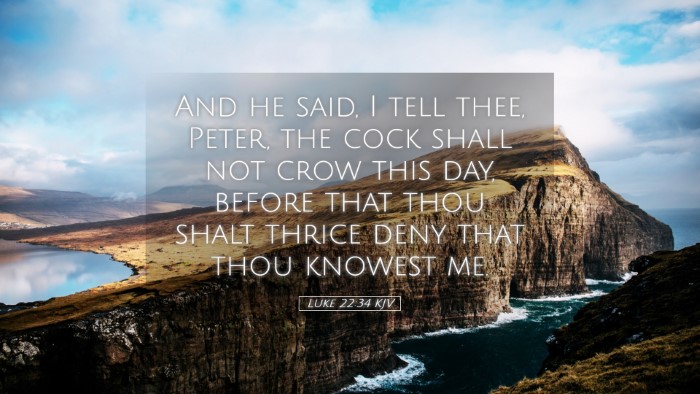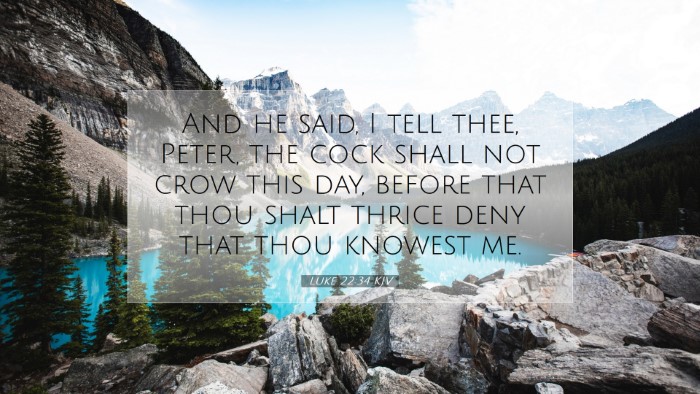Commentary on Luke 22:34
Verse: "And he said, I tell thee, Peter, the cock shall not crow this day, before that thou shalt thrice deny that thou knowest me."
Introduction
The verse from Luke 22:34 is a profound moment in the narrative of the Gospel, capturing Christ's foreknowledge of Peter's denial. In this commentary, we will explore insights from Matthew Henry, Albert Barnes, and Adam Clarke, considering the implications of this prophecy for understanding human frailty, divine foreknowledge, the nature of repentance, and the grace of restoration.
Contextual Background
Prior to this verse, Jesus has been sharing the Last Supper with His disciples, establishing the new covenant and preparing them for His impending Passion. This particular prediction highlights both Peter's zeal and the fragility of human resolve when faced with fear and danger.
Matthew Henry's Commentary
Matthew Henry notes the significance of Christ’s prediction as a demonstration of His divine foresight. He emphasizes three key elements:
- Foresight of Denial: Jesus directly addresses Peter, indicating that He is fully aware of the trials that await His followers. This serves to remind us of the omniscience of Christ.
- The Nature of Human Weakness: Henry points out that Peter, despite his bold declarations of loyalty, represents the all-too-human characteristic of failing under pressure. This moment of denial serves as a cautionary tale that highlights our propensity to falter.
- Restoration and Hope: Although the prediction is grim, Henry also reflects on the eventual restoration of Peter, signifying that failure does not equate to disqualification from service in God’s kingdom.
Albert Barnes' Insights
Albert Barnes provides a more focused exploration of the metaphor of the cock crowing. He interprets:
- Cultural Significance: The crowing of the cock was a common indication of the time, marking the shift from night to day. Barnes argues that this serves as a sobering reminder of the true nature of time and accountability before God.
- The Timing of Denial: Barnes emphasizes that Peter’s denial would come quickly, indicating the urgency of Christ's warning. This emphasizes the idea that sin can arise swiftly even amongst the most devoted followers.
- Symbol of Vigilance: Through this passage, Barnes encourages believers to remain vigilant against the temptations that may lead to denial of Christ, serving as a reminder of the need for continual prayer and watchfulness.
Adam Clarke's Commentary
Adam Clarke’s insights delve into the psychological aspects of Peter’s character and the gravity of the upcoming trials:
- Peter’s Boldness: Clarke discusses Peter's impetuous nature, noting that his confidence is paradoxically tied to his upcoming failure. This serves as a reminder that self-assurance can lead to spiritual vulnerability.
- The Denial Itself: Clarke explores the implications of denying Christ. He emphasizes that such denials can occur in various forms, whether through direct rejection or through silence in the face of persecution.
- Hope for Redemption: Concluding his reflections, Clarke highlights the grace that follows Peter's denial. He draws attention to the restoration scene post-resurrection, where Christ reinstates Peter, reinforcing the message that there is always a path back to communion with God.
Theological Implications
This verse proposes significant theological questions worthy of robust discussion:
- The Nature of Prophecy: The predictive nature of Christ raises questions about the relationship between divine sovereignty and human free will. How does this foreknowledge interplay with Peter's agency?
- Human Conditio: Peter’s denial acts as an archetype for the believer's struggles with sin and faithfulness. It prompts self-reflection among pastors, theologians, and students regarding their own weaknesses.
- The Promise of Restoration: This passage ultimately offers hope. Believers can take heart in the assurance that, like Peter, they can experience restoration despite failures.
Conclusion
Luke 22:34 encapsulates a pivotal moment of revelation, exposing both the fragility of human commitment and the depth of divine grace. The insights of Matthew Henry, Albert Barnes, and Adam Clarke collectively enrich our understanding of this verse. For pastors, students, and scholars alike, it serves as a profound reminder of the call to vigilance, the inevitability of human failure, and the overwhelming grace that beckons us towards restoration and purpose in Christ.


